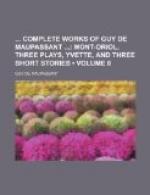“What was that?” she asked, trembling.
The Count went to the window without speaking, and she followed him, with her arms round him, and looked half timidly, half curiously out into the darkness, where large bright spots were moving about in pairs, in the park at her feet.
“Are they will-o’-the-wisps?” she whispered.
“No, my child, they are wolves,” the Count replied, fetching his double-barreled gun, which he loaded, and went out on the snow-covered balcony, while she drew the fur more closely over her bosom, and followed him.
“Will you shoot?” the Count asked her in a whisper, and when she nodded, he said: “Aim straight at the first pair of bright spots that you see; they are the eyes of those amiable brutes.”
Then he handed her the gun and pointed it for her.
“That is the way—are you pointing straight?”
“Yes.”
“Then fire.”
A flash, a report, which the echo from the hills repeats four times, and two of the unpleasant-looking lights had vanished.
Then the Count fired, and by that time their people were all awake; they drove away the wolves with torches and shouts, and laid the two large animals, the spoils of a Polish wedding night, at the feet of their young mistress.
And the days that followed resembled that night. The Count showed himself the most attentive husband, as his wife’s knight and slave, and she felt quite at home in that dull castle; she rode, drove, smoked, read French novels and beat her servants as well as any Polish Countess could have done. In the course of a few years, she presented the Count with two children, and although he appeared very happy at that, yet, like most husbands, he grew continually cooler, more indolent, and neglectful of her. From time to time he left the castle, to see after his affairs in the capital, and the intervals between those journeys became continually shorter. Faniska felt that her husband was tired of her, and much as it grieved her, she did not let him notice it; she was always the same.
But at last the Count remained away altogether; at first he used to write, but at last the poor, weeping woman did not even receive letters to comfort her in her unhappy solitude, and his lawyer sent the money that she and her children required.




